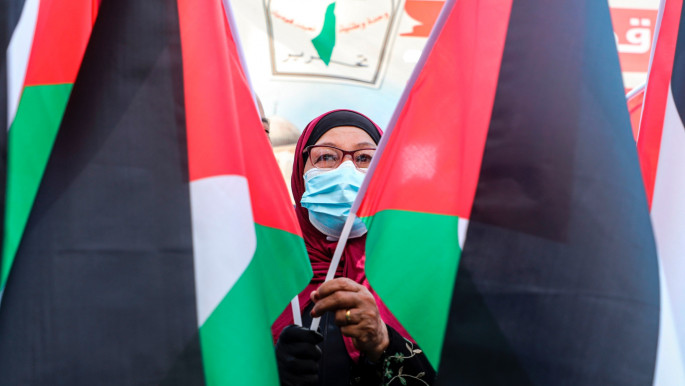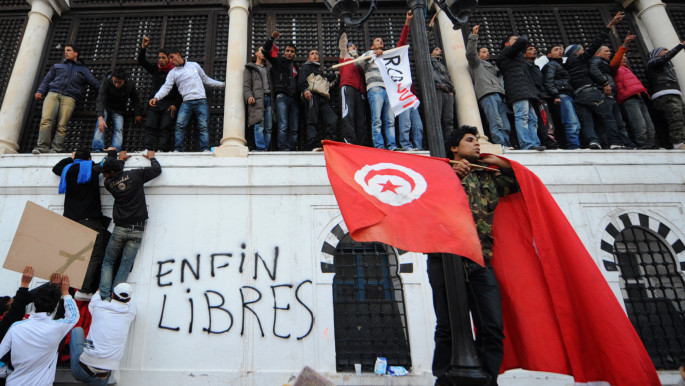Iran, Israel and Turkey: How regional actors filled the Arab Spring's power vacuum
But with the exception of Tunisia, the Arab Spring has not brought the changes demanded by the groundswell of protests in 2011, with mostly cosmetic reforms, if any, and the emergence of new authoritarian systems and enduring civil wars.
A decade following the revolutions, the role of Western and non-Arab powers in the region has dramatically changed as the geopolitical map of the Middle East transforms, with traditional powers such as Syria, Egypt, as well as Libya and Iraq, losing their relevance as other non-Arab powers like Turkey, Iran and Israel emerged as new regional centres of influence.
Erosion of US influence
The popular awakenings in the region coincided with the gradual decline of Washington's role as an absolute regional hegemon. Some analysts also argue that the Arab Spring represented a turning point for Gulf nations, who began to realise that they could not expect active support from Washington, especially after US inaction during 2011 protests that rocked Bahrain and Oman, which were eventually suppressed with Saudi Arabia's assistance.
 |
The role of Western and non-Arab powers in the region has dramatically changed as the geopolitical map of the Middle East transforms |  |
Nir Boms, a research fellow at the Moshe Dayan Center at Tel Aviv University and International Center for Counter Terrorism in Hertzliya, says that the weakening US presence helped the formation of a new regional axis, pushing some regional allies to come together in order to face these new emerging threats. "This, eventually, resulted in significant moves such as the Abraham Accords," he said.
However, other analysts, such as Gabriel Glickman, an Associate Fellow at the Bar-Ilan University's Begin-Sadat Center for Strategic Studies, expects a narrower American interest in the region moving forward, one that will focus on practical endeavours like intelligence gathering and anti-terrorism rather than grandiose aims of rebuilding countries or spreading democracy. This version of America in the Middle East could restore some of its influence.
Iran
Iran, along with other regional powers such as the Gulf states, Israel and Turkey, will certainly continue to shape events in the region, with the Gulf-Iran rivalry having already driven fundamental changes in the last few years, including the various normalisation deals between Israel and Gulf monarchies.
 |
|
| Read more: Israel normalisation deals reflect the rupture between repressive regimes and Arab societies |
However, Iran's gains during the Arab Spring have tended to be short-lived, according to Trita Parsi, the executive vice president of the Quincy Institute for Responsible Statecraft.
The fall of the Mubarak regime in Egypt was welcomed in Tehran, but the rise of Abdel-Fattah el-Sisi once again saw ties revert to enmity. Cairo is even more dependent on Saudi Arabia in recent years, while Iran's own influence has significantly declined.
In Yemen, meanwhile, Iran has not gained from its involvement in the war, rather, it has raised the cost to Saudi Arabia for having initiated the deadly conflict. At the same time, Iran's standing in the Arab world has taken a significant beating due to its support for the Assad regime in Syria, Parsi told The New Arab.
Indeed, Iran's total "score" in the last decade in terms of benefits and the expansion of its influence in the region could be described as mixed at best, according to Boms. On the one hand, Iran has managed to project power, hold force in Yemen, demonstrate significant proxy powers and help Assad win Syria's brutal war. On the other hand, it has suffered growing isolation, discontent, financial devastation and the loss of face from witnessing its nuclear program sabotaged again and again.
While heavy sanctions have not been able to change Iran's regional ambitions and behaviour, the extent to which Tehran has been able to change the balance of regional power to further its own interests is questionable. Nevertheless, Iran has developed effective missile forces and hybrid warfare capabilities.
Its interventions in Lebanon, Iraq, and Syria (and in Yemen through its proxies) have given it considerable influence, but it is debatable as to what the true strategic benefits of Iranian engagement in the region are, except militarily and with modest political achievements. Since almost every country that Iran has an influence on could fall into the category of 'failed state', it is clear that Tehran's engagement cannot bring any meaningful economic benefits to the Islamic Republic, which faces economic hardship of its own.
 |
The popular awakenings in the Middle East coincided with the gradual decline of Washington's role as an absolute regional hegemon |  |
According to Parsi, Iran's involvement in regional conflicts has not been driven by an economic calculus, but rather a security strategy. "From an economic standpoint, it is difficult to see a single foreign intervention by any state having been economically beneficial," he said.
Moreover, the government is facing growing domestic problems as the result of decades of poor economic policies, compounded by the impact of US sanctions, Covid-19 and the oil price slump. While Iran has been the master of asymmetric warfare, it is possible that Iran's influence in the region will deteriorate in the future due to accumulated problems.
Boms says that the Islamic republic has been under attack on a number of fronts and despite its motivation will face many limitations. "So far, Iran is still focusing on projecting and building its power – but it already had to cut budgets and, as a result, has limited the use of some of its proxies," he added.
Nonetheless, in Parsi's view the policy of seeking to contain Iran has been a significant failure as Tehran's influence - and nuclear program - has grown over the past two decades, despite sanctions.
 |
|
| Read more: Tunisia's rocky path to democracy: Fighting to advance the hard-won freedoms of the revolution |
Turkey
Turkey initially welcomed the democratic uprisings against authoritarian Arab regimes, and it was the only power that had open communication channels with new revolutionary movements and transitional governments throughout the region.
Dr. Selçuk Çolakoğlu, Director of the Turkish Center for Asia Pacific Studies, says that Turkey was once a model at the beginning of the Arab Spring with its vibrant developing economy and pluralistic democratic structures. Turkey's soft power was dominant across the Arab World without bearing any political and strategic costs. Some Arab Spring movements openly said that Turkey represented a model to emulate and this has significantly improved the country's image.
Çolakoğlu explained that although Turkey's traditional Kemalist foreign policy has refused any religious attachments, the ruling Justice and Development Party (AKP) has forged an ideological alliance with the Muslim Brotherhood network in the Middle East and wants to act as a leader for the Islamic world.
However, the AKP government's decision to use Turkey's hard (military) power in Arab conflicts has undermined the Turkish capacity for soft power dramatically. Furthermore, Turkey has been hosting four million Syrian refugees since the beginning of the Arab Spring, and the lack of political and economic stability within the country will, according to Çolakoğlu, likely diminish Turkey's international capacity soon. "As a middle power barely having 1% of world GDP, Turkey cannot sustain its unilateral hard (military) power policies in the region," he told The New Arab.
 |
Non-Arab powers like Turkey, Iran and Israel have emerged as new regional centres of influence |  |
Ankara has maintained a friendship with Doha, as well as small pieces of land and influence in northern Syria and northern Iraq, as well as sway with the Tripoli-based Government of National Accord (GNA) government. But Turkey has also largely lost Saudi Arabia and Egypt as vital markets for Turkish manufacturers.
While Turkey is currently behaving as a rising regional hegemon, Çolakoğlu says that the ruling AKP is facing growing pressure from the opposition and a public majority regarding its pro-Muslim Brotherhood policies. According to Çolakoğlu, there is a strong demand for the reset of Turkish foreign policy and an end to ideologically and religiously motivated strategies in the Middle East.
Israel
During the course of the Arab Spring, Israel had been politically isolated from the region. Until recent normalisation deals with the UAE and Bahrain its relevance was only based on military supremacy over its neighbours, rather than the ability to project soft-power and proactively shape the region's trends in a political or economic sense. However, this may significantly change in the near future.
 |
|
| How Putin's Russia helped crush the Arab Spring |
"Israel is poised to have a significant influence in the coming years. Netanyahu, for all his faults, shrewdly positioned Israel as an indispensable nation," Glickman says, especially after the Israeli PM addressed the US Congress in 2015 sending a clear message that Israel was determined to stop Iran's nuclear program at all costs - even to the detriment of relations with the United States.
This was also a turning point in its relations with Gulf monarchies, which realised that Israel was a dependable ally in their fight against Iran.
Although it is too early to speculate whether a new Arab-Israeli alliance is emerging and whether this "axis" will develop common views on a broader scope of issues rather than just perceiving Iran as the main security threat, Boms thinks that the recent agreements have opened a path of integration for Israel in the region that could include the economy, tourism, trade, security collaboration and culture.
However, Israel's role in regional conflicts during the Arab Spring, such as Syria, and the fact that it has shored up alliances with authoritarian regimes, indicate that such alliances work best for its interests rather than Arab democracies.
 |
Israel has benefitted from the increasing chaos in the region and the collapse of anything resembling an Arab coalition against its occupation of Palestine |  |
In Parsi's opinion, Israel has benefitted from the increasing chaos in the region and the collapse of anything resembling an Arab coalition against its occupation of Palestine. "Israel has taken advantage of the weakness of Arab dictators to strike a deal with them in which Israel will defend them in Washington against pressures from the US on human rights and other issues, as well as help ensure their continued reign, in return for their support (and in the case of the UAE, financing) of the occupation of Palestine," he told The New Arab.
The Middle East, therefore, could become a polygon for three emerging power axes: the Iran-led Shia axis, the Gulf-Israeli axis and the Turkish-led alliance. It's not inconceivable either that Turkey could in some way support the Iranian coalition as there has been a rapprochement between Turkey and Iran that goes against conventional claims of an insurmountable regional conflict.
However, the emerging three-rival axes in the region do not necessarily serve Turkey's long-term interests, says Çolakoğlu, with Ankara ideally aiming to be a facilitator of dialogue between the Iran-led axis and the Gulf-Israeli axis rather than creating a rival axis of its own.
Stasa Salacanin is a freelance journalist who has written extensively on Middle Eastern affairs, trade and political relations, Syria and Yemen, and terrorism and defence.





 Follow the Middle East's top stories in English at The New Arab on Google News
Follow the Middle East's top stories in English at The New Arab on Google News


